6 Things That Happen if You Exercise Without Eating Enough
- January 7, 2021
- Last Updated: November 27, 2023
- 0 Comments
- Nutrition
What happens if you exercise without eating enough? Adequate nutrition is necessary for gains in the gym or running on the road.
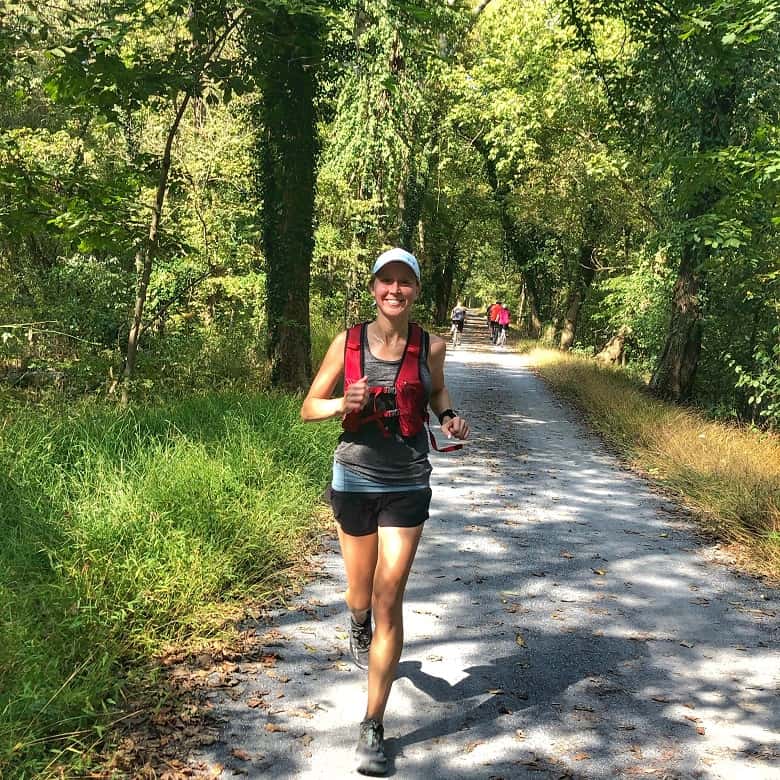
As an Amazon Associate, I may earn from qualifying purchases. You can read more here on our Disclaimer and Privacy Page.
Your workouts could be suffering if you are not eating enough and working out. That’s the bottom line.
While the effects of undereating may look different for everyone, it is sure to catch up with you. Our bodies want to maintain equilibrium, so when it’s not in a balanced state, it gives you signs…eventually.
So, this post is going to review what happens when you exercise too much and don’t eat enough to fuel that exercise.
Working out without eating enough can take a toll..and here’s how.
I would say about 75-80% of the clients that come to me for sports nutrition are underfueling, or not eating enough for their workouts.
And it’s not always intentional. Running a lot of miles requires eating a lot of food.
Most people don’t know what an adequate amount of food looks like because diet culture isn’t showing them that.
And not eating enough, while it may be praised in our toxic diet culture, will impact your training sessions, no doubt.
How Does Diet Culture Impact Our Workouts?
Essentially, diet culture is the food environment we live in. There are messages coming at us constantly about foods being “good” or “bad” (foods have no moral value), foods being “fattening” or “too high in sugar.”
All of these thoughts and terms have created a fear-mongering and a good/bad mentality around food (also known as the food police). We’re “good” if we eat certain foods and “bad” if we eat others.
It’s time to stop feeling guilty after eating! Eating is necessary, and adequate eating is so important as an athlete.
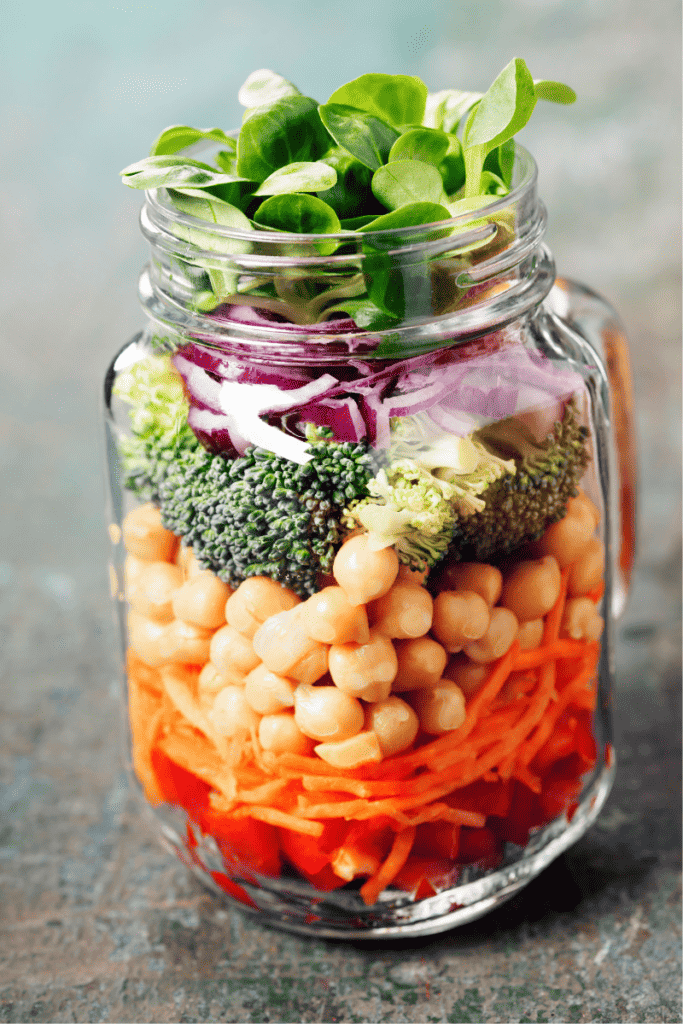
We’ve attached morality to a totally neutral event: eating!
And in the process, we’ve forgotten how to eat like a normal person or enjoy our food and make peace with food.
Instead, the culture is showing small portions, empty plates, mostly fruit and veggies, no sugar, low carbohydrate diets, etc.
This is one reason why I created the ebook, The Runners Guide to Intuitive Eating.
I want you to learn how to fuel adequately for your sport, and understand what to eat before running, as well as how to properly re-fuel after a run or workout.
A SPORTS DIETITIAN IN YOUR POCKET?!
This is the sports nutrition resource you’ve been missing in your training. It can help make sure you’re eating enough for performance and recovery. – grab it now!
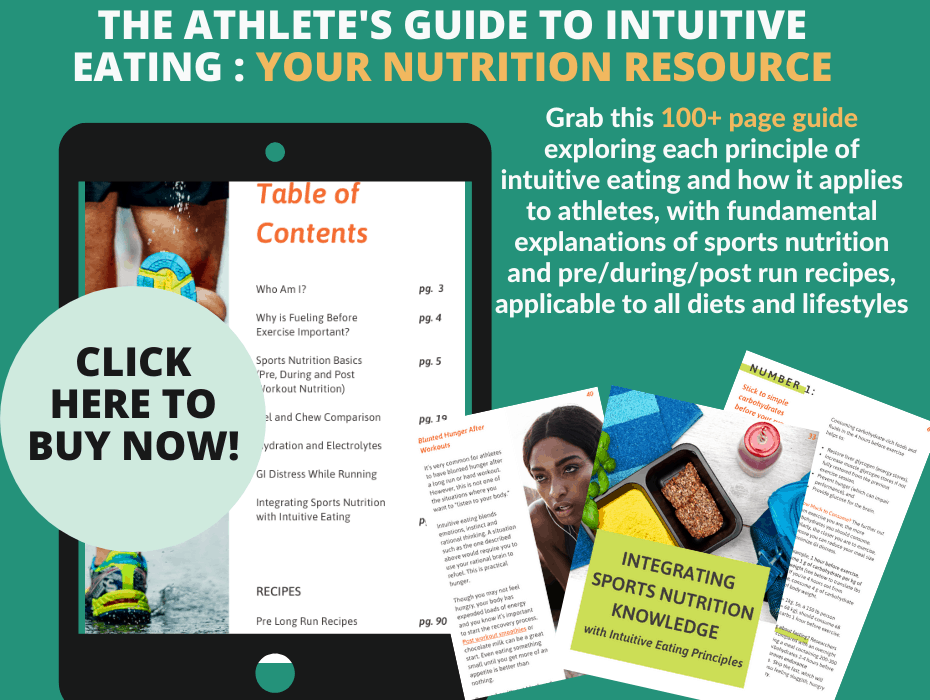
Am I Eating Enough?
Oftentimes, you may not feel hungry after a run. In fact, this is very common. If you’re not hungry after a workout, there are still several things you can do!
And this doesn’t just have to be to refuel after a long run. Even after a strength workout or upper body workout
There are going to be times when you have to use your head, not your body, to make your fuel and recovery choices if you want to perform well.
Oftentimes, when I meet with clients and calculate their needs as they increase their running times and distances, they are surprised when I tell them how much they should be eating.
It’s easy for us to forget how good our bodies are at using fuel when we let them.
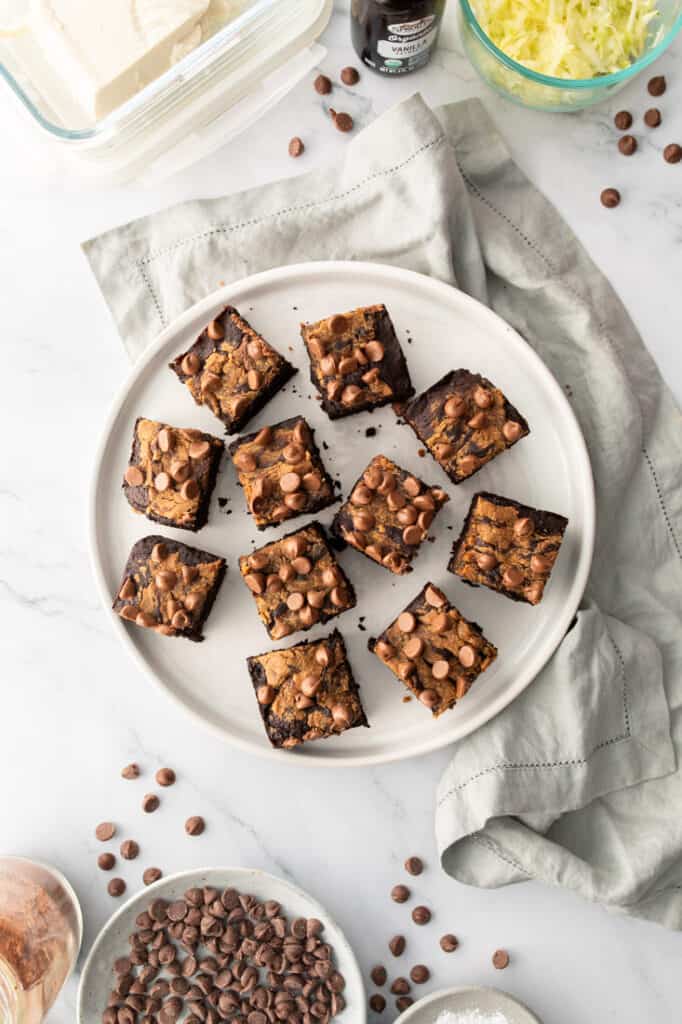
Underfueling your workouts, both consciously (through food rules and diet culture) and unconsciously, can lead to a condition known as relative energy deficiency in sport, called RED-S, for short.
Here are just some ways in which RED-S can impact your workouts and health.
- RED-S affects many aspects of health including physiological, emotional, mental, relational and overall health.
- Increased risk for injuries
- Loss of menstruation, which can throw hormones out of whack and jeopardize bone health
- Extreme fatigue
- Cognitive difficulties
- Trouble sleeping
If you’re training for a full or half marathon and you don’t have a marathon nutrition plan in place, you’re in trouble. Check out these tips for chews for running to ensure you’re getting enough carbohydrates during long distance events.
Even short distances require extra fueling – check out this post on nutrition for cross country runners for sample diet tips.
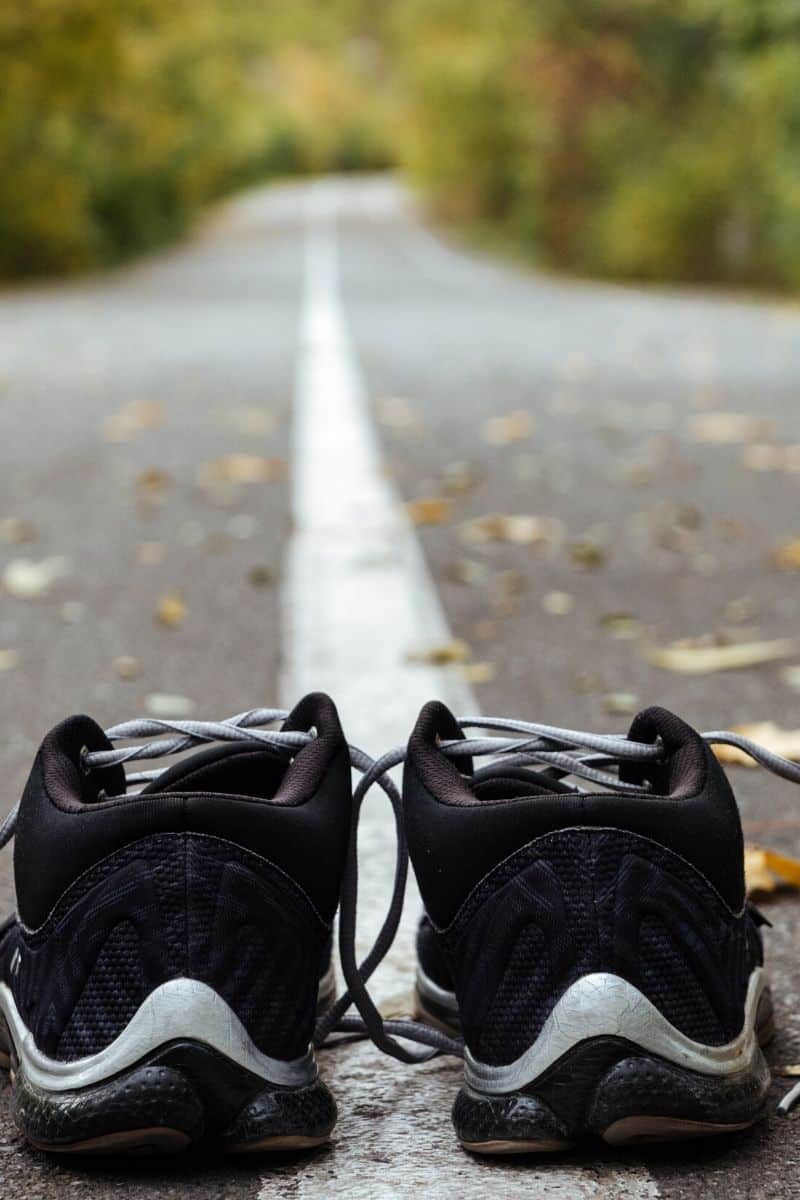
What Happens If You Exercise Without Eating Enough?
In other words, what happens if you underfuel your workouts? Working out and not eating, whether conscious or unconscious will jeopardize your workouts and likely your health, too.
Maybe RED-S doesn’t sound as harmful as it really is. Take a look at these symptoms and learn why working out and not eating enough don’t go hand in hand.

Here are some of the main signs that you may not be eating enough to support your workouts.
Maybe all of these apply to you…or, maybe just a few?
1. You’re Not Recovering Properly
Are you constantly tired and sore from the previous day’s run or workout, or wondering “Why am I not recovering from workouts?”
This is normal after long runs or hard, fast workouts, but shouldn’t be the norm on the regular. Especially if you’re including adequate rest days, your body should be able to recover.
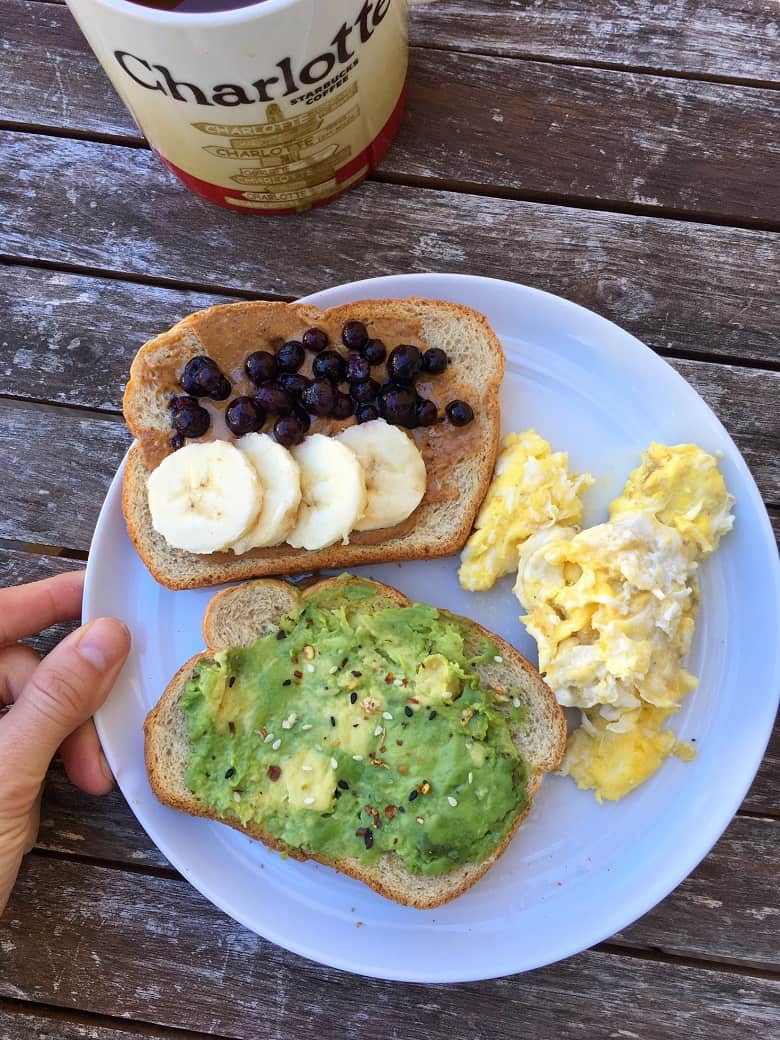
Not recovering could relate back to poor muscle function and decreased muscle strength, increased injury risk, and a decreased training response. All of these are side effects of undereating.
Here’s a little bit about nutrition for injury recovery.
If not, it may be time to evaluate what you’re eating, and also how much you’re training.
Something to think about is, Are you engaging in compulsive exercise or are you actually enjoying it?
2. You’re Tired All the Time or Your Sleep is Disturbed
I’m sure you’ve been in the camp wondering, ‘”WHY am I always tired?” I’m sleeping well. Maybe I need to take more vitamins!”
No, you don’t need more vitamins. You likely need more food. There are some instances where you also may need supplements, but this is far from a universal approach for all.
Remember that supplements are meant to supplement your diet, not replace it. You can get vitamins through your food!
Your fatigue may be a result of overtraining and/or underfueling. This can translate to a lack of energy when running.

Exercise is a Stressor
Exercise is a stress to the body. I’ll say that again. Exercise evokes stress on our bodies. In most circumstances, this is a good stressor that our bodies are equipped to handle.
But, if we’re already stressing our bodies (maybe from a night of poor sleep, battling a cold, or undereating), exercise can cause more damage.
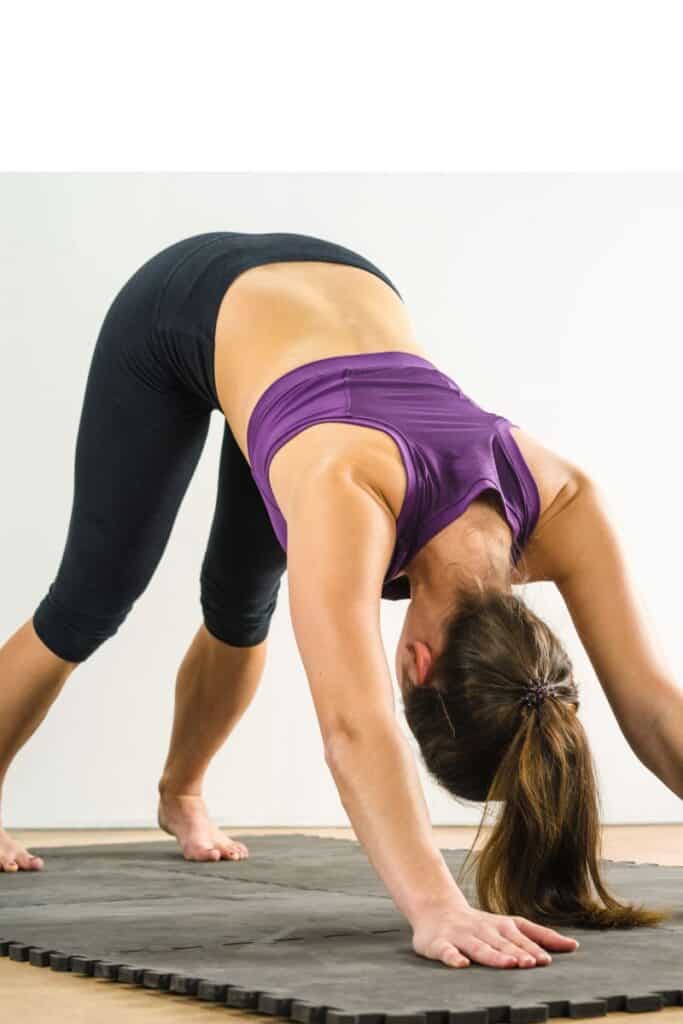
Furthermore, low blood sugar from undereating can act as a stressor on the body, therefore waking you up. You also won’t sleep well if you feel hungry.
Studies have linked undereating with a reduction in deep sleep.
Deep sleep is important because that’s when your body is repairing muscles and organs, and helps improve recovery, cognitive function and more.
Undereating also decreases sleep quality, so although you think you may be getting eight hours of sleep, the quality of that sleep is very poor. Energy restriction often leads to fragmented sleep.
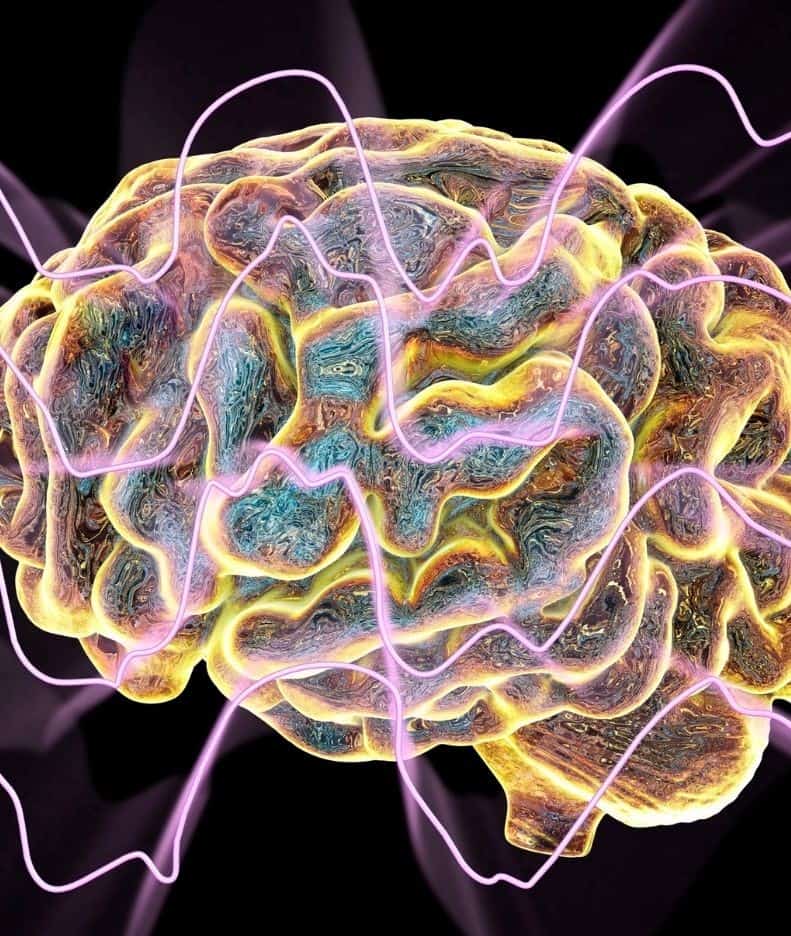
This is likely due to the hypometabolic state (aka burning less calories during sleep) that then affects body temperature and sleep patterns (Karklin, 1994.).
Inadequate sleep will also alter your hunger hormones and affect hunger and fullness levels, cravings, and can also increase the risk of injury, among other things.
There is hope in improving sleep when you regain nutrition, though. A 2004 study published in the journal, Sleep Medicine, found that at least partial weight restoration resulted in more deep sleep.
We interviewed sleep expert and RD, Amy Bender, on the Nail your Nutrition podcast. It’s worth a listen as she gives great recommendations to improve sleep hygiene and quality.

This is also one scenario where tart cherry juice may come in handy. It provides carbohydrates, which are always necessary, but can also help with natural melatonin production before bed.
3. You Think About Food Constantly
Repeatedly working out without eating enough will lead to extreme physical hunger. And that often translates as thinking about food.
Thinking about food is not a sign of food addiction, as diet culture may have you think. Instead, it’s a natural and biological response for survival.
When you’re not getting enough food, of course, you will continue to think about food. Our bodies tend to focus on what we don’t have enough of, or what we tell them not to focus on.

This is why you may crave ice cream more when you tell yourself you can’t have ice cream or it’s off-limits.
Think about how you feel when you actually do eat food that makes you feel full. You probably stop thinking about food until you feel hungry again.
Imagine being chronically hungry – of course, your mind is always thinking about food.
4. Nutrient Deficiencies
Not eating enough will also lead to nutrient deficiencies. Here are some of the common ones through the research that may result from exercising without eating enough.
- Iron – Iron deficiency is a big one as iron for runners, especially females, may fall beneath recommendations. This impacts your oxygen uptake and your stamina.
- Protein – If you’re not meeting your caloric intake, you’re likely falling short of your protein intake, which is so important for recovery. Knowing how much protein athletes need is often eye opening.
- Calcium– Bone health is a big one when not eating enough. This can lead to an increased risk of stress fractures, which we’ll touch on shortly. But, calcium is an important electrolyte that also plays a role in heart health, muscle function and more.
5. You’re Getting Injured More Often
We often think about stress fractures when we touch on injuries for running. However, it makes sense that there would be a higher risk for injury when you’re restricting or underfueling.
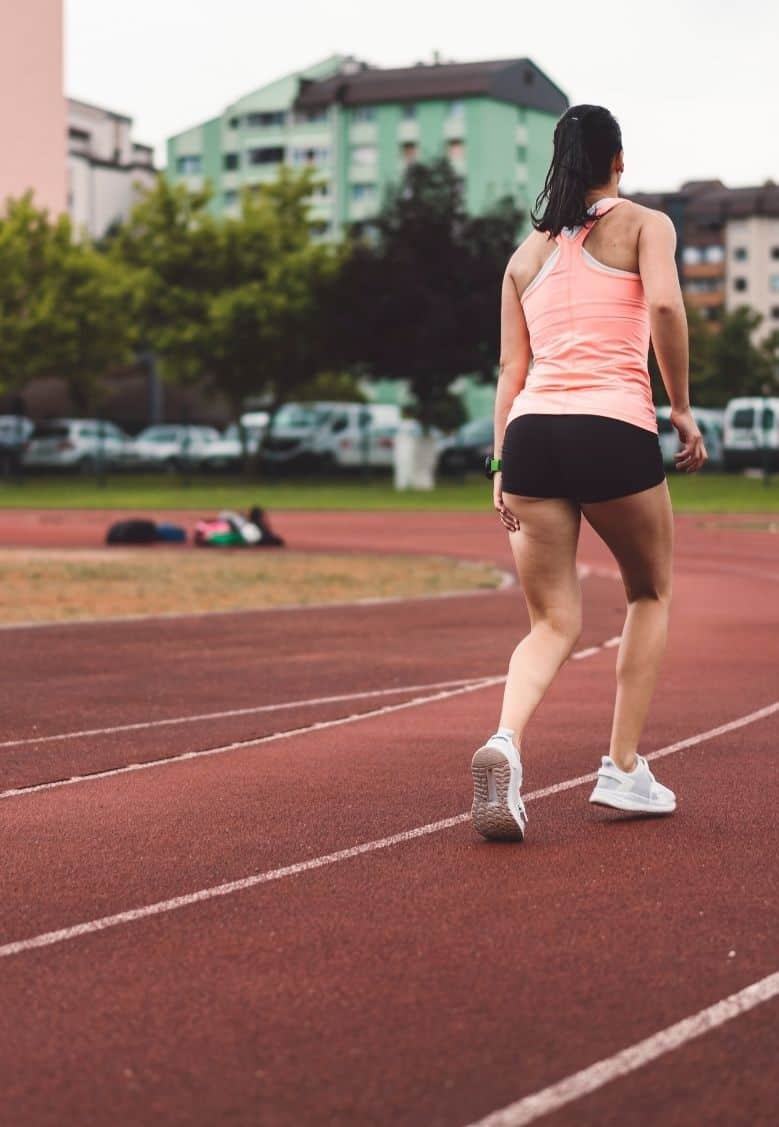
When losing weight, we never lose just fat – we also lose muscle. Therefore, being in an energy-deficient state leads to decreased muscle strength and bone repair, impaired judgment and decreased coordination (which can also increase the risk of injuries), and decreased training response, among other things.
“An energy deficit, defined as an inadequate calorie intake relative to exercise energy expenditure, sustained over a period of weeks or months can lower leptin, estradiol, and insulin-like growth factor-1 and can increase cortisol. These hormone disruptions can decrease osteoblast activity and increase bone resorption, yielding an imbalance in bone turnover that can in turn, lower the capacity to lay down newly formed bone and reduce the ability to repair microdamage.”
Barrack MT, Gibbs JC, De Souza MJ, Williams NI, Nichols JF, Rauh MJ, Nattiv A. Higher incidence of bone stress injuries with increasing female athlete triad-related risk factors: a prospective multisite study of exercising girls and women. Am J Sports Med. 2014 Apr;42(4):949-58
As you can imagine, undereating and exercising can be dangerous.
I love this graphic from the International Olympic Committee for visually seeing how many body functions can be affected.
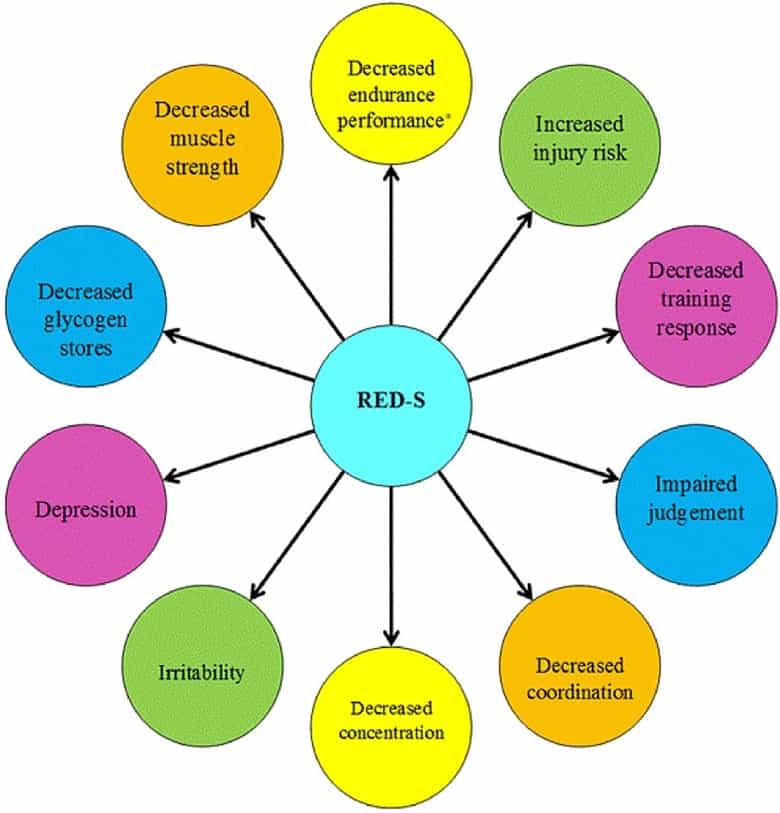
6. You Aren’t Menstruating
Another name for this is amenorrhea. There are two types of amenorrhea, and this is specifically referring to secondary amenorrhea, or hypothalamic amenorrhea (HA).
Let’s review a little bit about why this happens. Amenorrhea = loss of menstruation.
A chronic energy deficit causes the body to start to conserve fuel for critical body processes. If there’s not enough energy coming in, the body essentially has to delegate which processes it will choose to fuel.
Obviously, it chooses to fuel processes that are essential to survival – like the heart pumping, lungs breathing. Having a period is not an essential mechanism for the body to survive. So, simply put, the body does not prioritize menstruation or reproduction. Also, insufficient energy suppresses the release of ovarian hormones.
All of this is controlled by the hypothalamus in the brain, which plays a central role in maintaining body systems. It determines whether it secretes or does not secrete hormones that affect organs and processes, such as reproduction.
One of my favorite easy-to-read resources about this is No Period, Now What. Nicola Rinaldi also has several resources for understanding this.
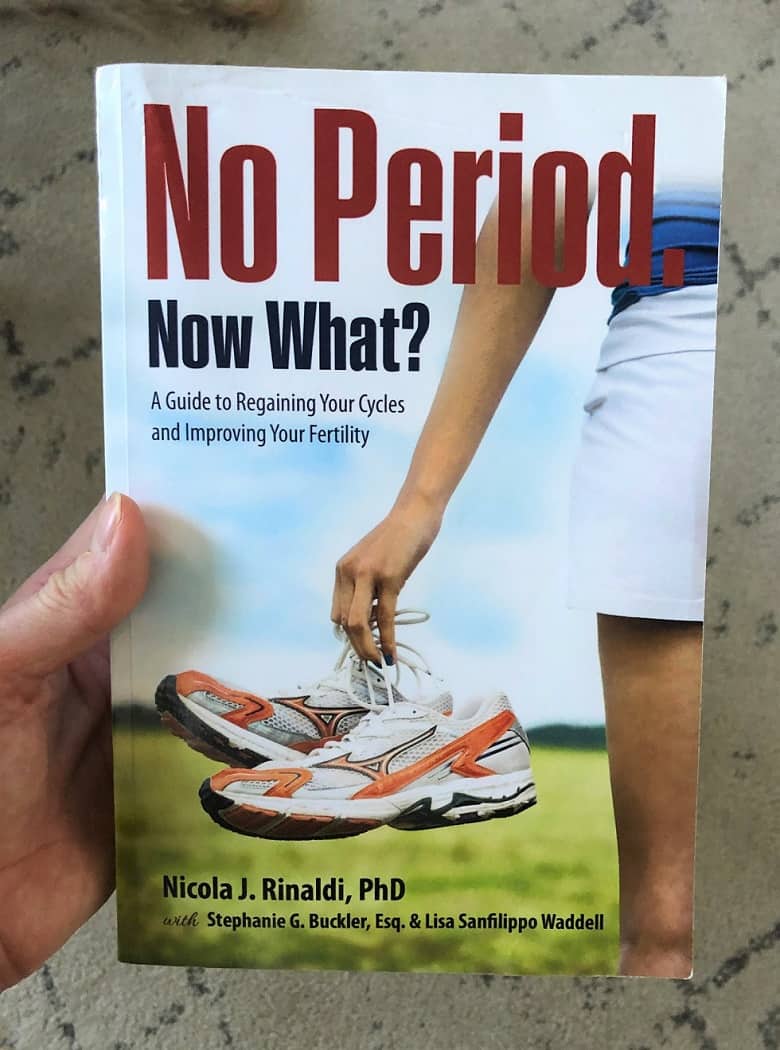
Essentially, high levels of cortisol (stress that can result from undereating) can prevent the hypothalamus from releasing reproductive hormones.
So, that’s why it’s called hypothalamic amenorrhea. If you google “hypothalamus-pituitary axis,” you can see some visuals as to why these pathways are affected.
An important point that I like to make here is that HA can happen even when weight is not extremely low. People can be undereating and restricting food in a larger body and still have hypothalamic amenorrhea.
What Does Adequate Fueling Look Like?
Here are some general nutrition tips for adequate fueling.
- Use performance plates – Adequate fueling isn’t sensationalized as “sexy,” so you probably aren’t seeing it. Building your plate by the performance plate method is important for every meal.
- Don’t avoid carbs – Carbohydrates are the predominant fuel for exercising muscles in terms of intensity and performance. As the low carb diet for runners continues to gain interest and momentum to “burn more fat” while running, know that no studies show that this way of eating improves performance, if that’s what you are after. You need carbohydrates and glycogen to prevent you from hitting the wall and have those last minute sprints available to finish.
- Plan for pre/post-workout snacks or meals – Also, making sure you are including adequate pre-run snacks and post run snacks is important, especially as your runs and workouts get longer. The main issue I see in athletes is inadequate carbohydrate intake before runs, and inadequate balanced meals and snacks after long runs and workouts. These healthy snacks for athletes can be a great source of inspiration for your post workout needs.
- Consider a night time snack – If you don’t feel that you have a proper appetite after exercise or still feel unsure you’re getting enough nutrition during the day, adding a nighttime snack may be prudent for you. Here are some important nutrition facts and ideas for a protein snack before bed.
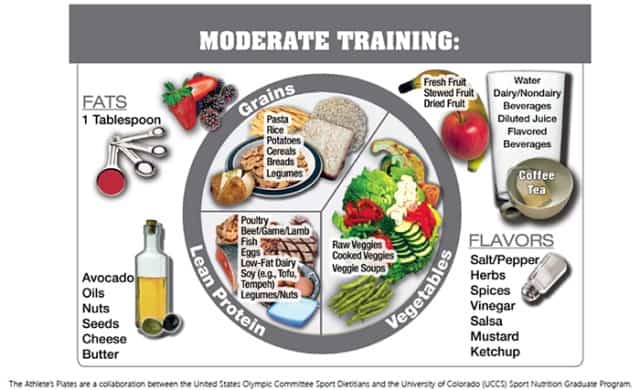
In short, we need adequate fuel for our bodies to function normally and optimally, and that goes for all of us beyond just athletes.
But, if you are starting a training session or getting ready to begin one, don’t forget about the importance of fueling and nutrition. If you have specific questions about matching your nutrition to your training, I can help!
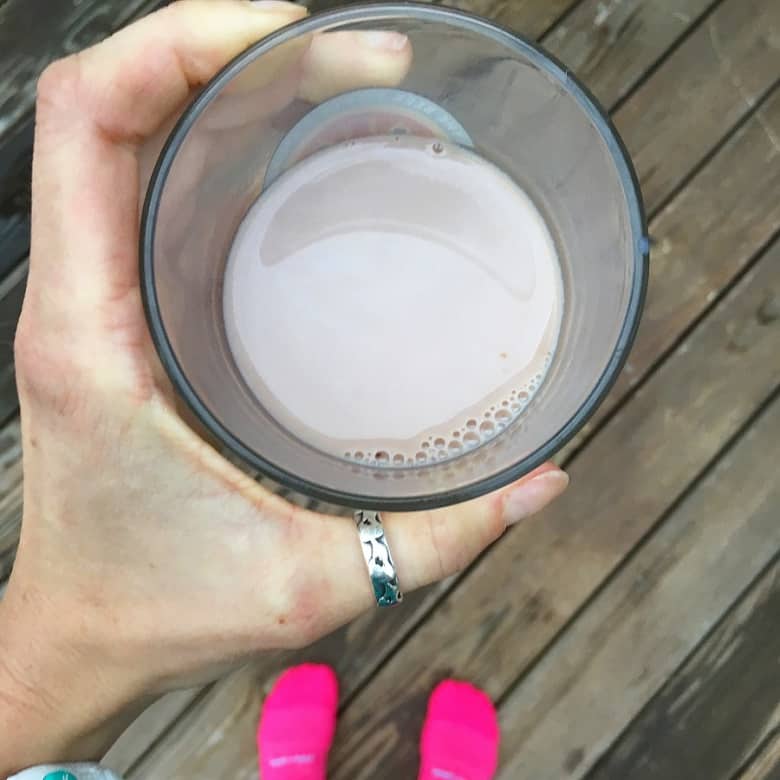
Key Takeaways
- Eating enough is important for exercise. Make sure to include adequate pre- and post-workout snacks and meals.
- Not eating enough can impact emotional, physical and mental health.
- Nutrient deficiencies, such as iron and calcium, are common when you aren’t eating enough.
- Exercising without eating enough on a regular basis will impact recovery, stamina and endurance.
- If you don’t know what “enough” looks like for you, schedule a free consultation with me to see if we’d be a good fit for working together.
A SPORTS DIETITIAN IN YOUR POCKET?!
This is the sports nutrition resource you’ve been missing in your training. It can help make sure you’re eating enough for performance and recovery. – grab it now!

References:
- Barrack MT, Gibbs JC, De Souza MJ, Williams NI, Nichols JF, Rauh MJ, Nattiv A. Higher incidence of bone stress injuries with increasing female athlete triad-related risk factors: a prospective multisite study of exercising girls and women. Am J Sports Med. 2014 Apr;42(4):949-58. doi: 10.1177/0363546513520295. Epub 2014 Feb 24. PMID: 24567250.
- Karklin A, Driver HS, Buffenstein R. Restricted energy intake affects nocturnal body temperature and sleep patterns. Am J Clin Nutr. 1994 Feb;59(2):346-9. doi: 10.1093/ajcn/59.2.346. PMID: 8310984.
- Lauer CJ, Krieg JC. Sleep in eating disorders. Sleep Med Rev. 2004 Apr;8(2):109-18. doi: 10.1016/S1087-0792(02)00122-3. PMID: 15033150.
- Mountjoy M, Sundgot-Borgen J, Burke L, Ackerman KE, Blauwet C, Constantini N, Lebrun C, Lundy B, Melin A, Meyer N, Sherman R, Tenforde AS, Torstveit MK, Budgett R. International Olympic Committee (IOC) Consensus Statement on Relative Energy Deficiency in Sport (RED-S): 2018 Update. Int J Sport Nutr Exerc Metab. 2018 Jul 1;28(4):316-331. doi: 10.1123/ijsnem.2018-0136. Epub 2018 May 17. PMID: 29771168.
Support Bucket List Tummy


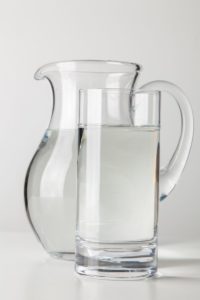
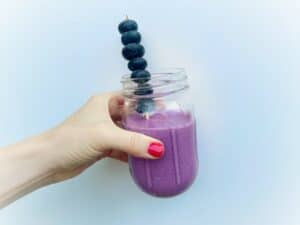

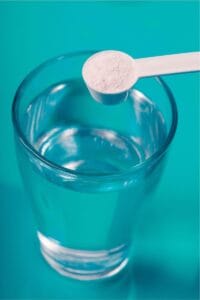

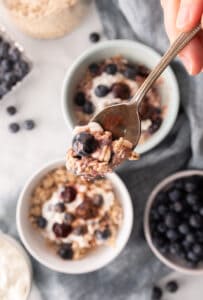

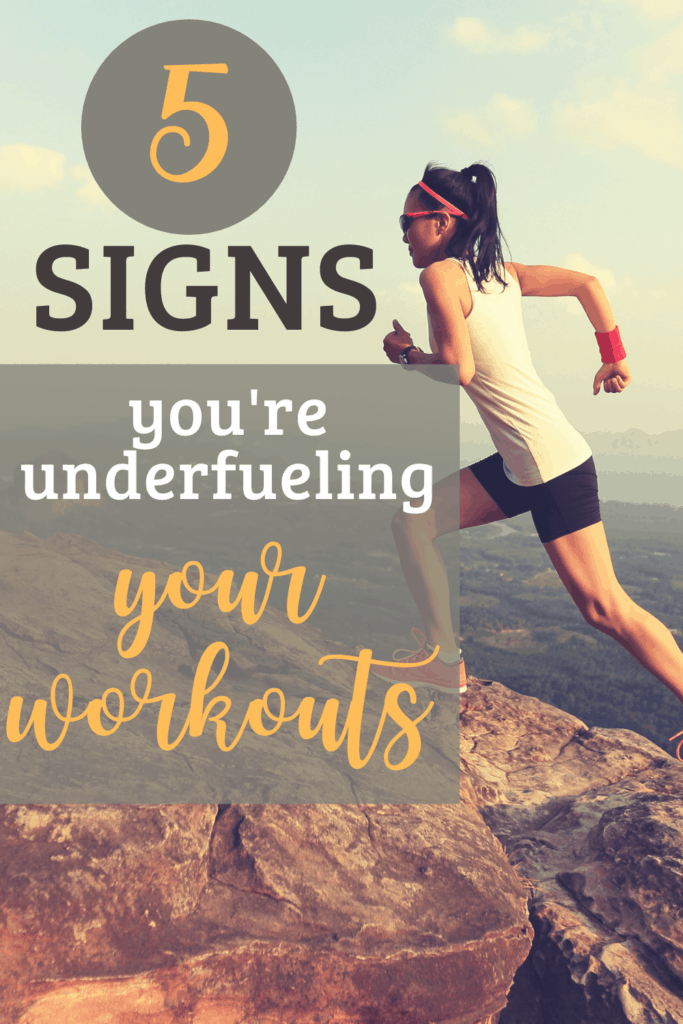
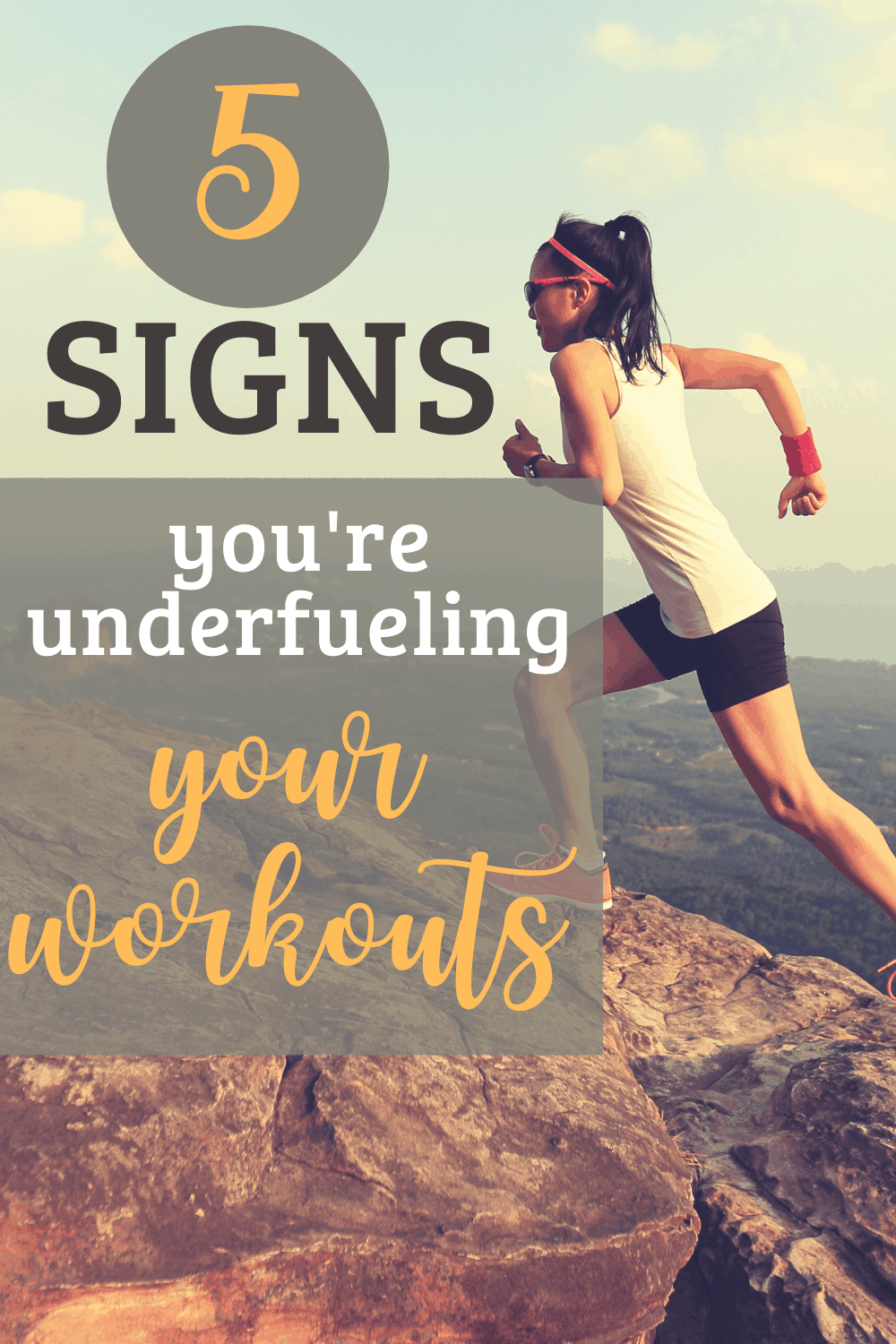


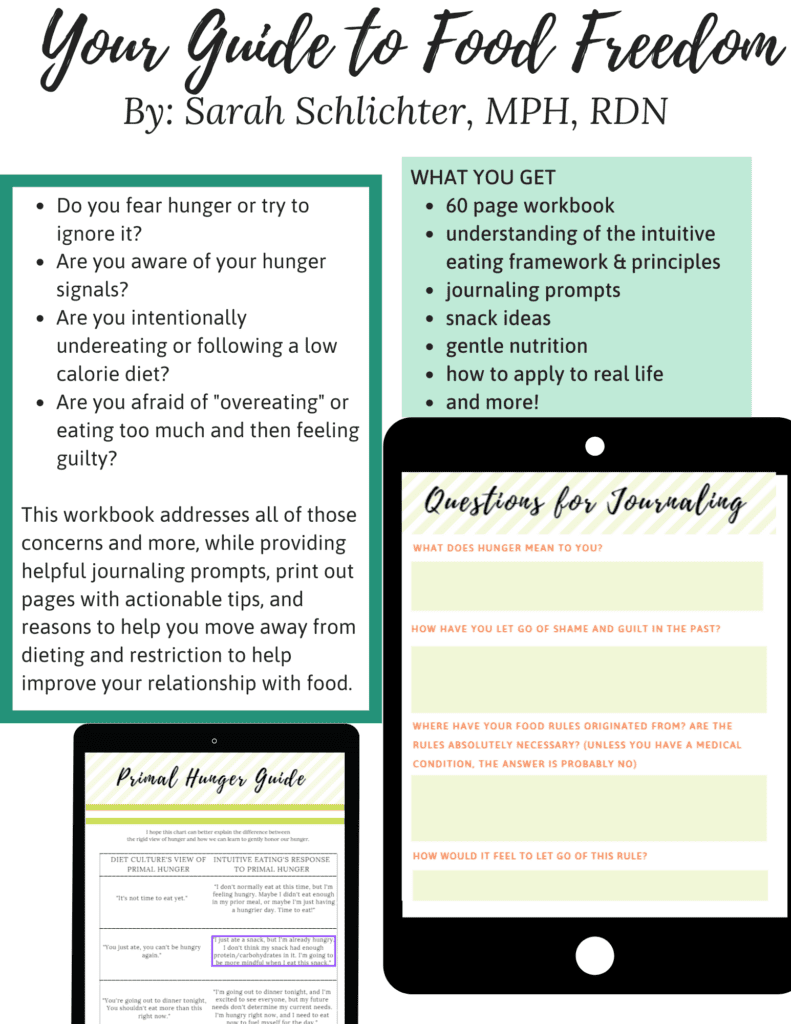




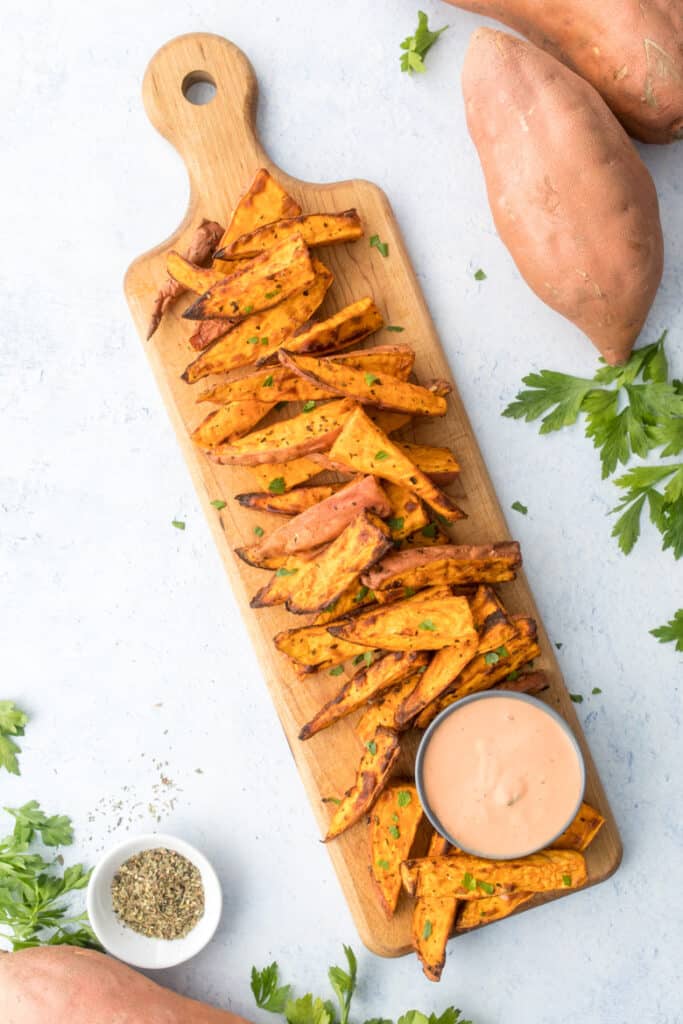
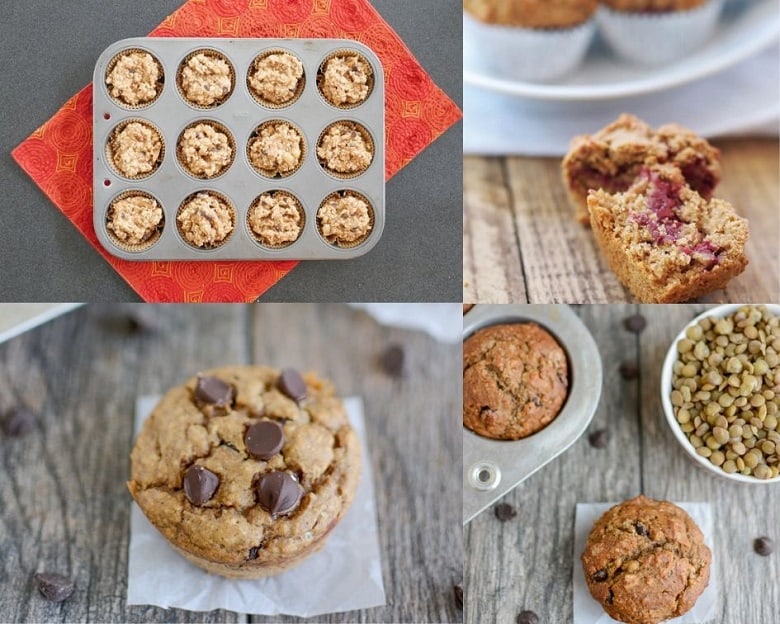

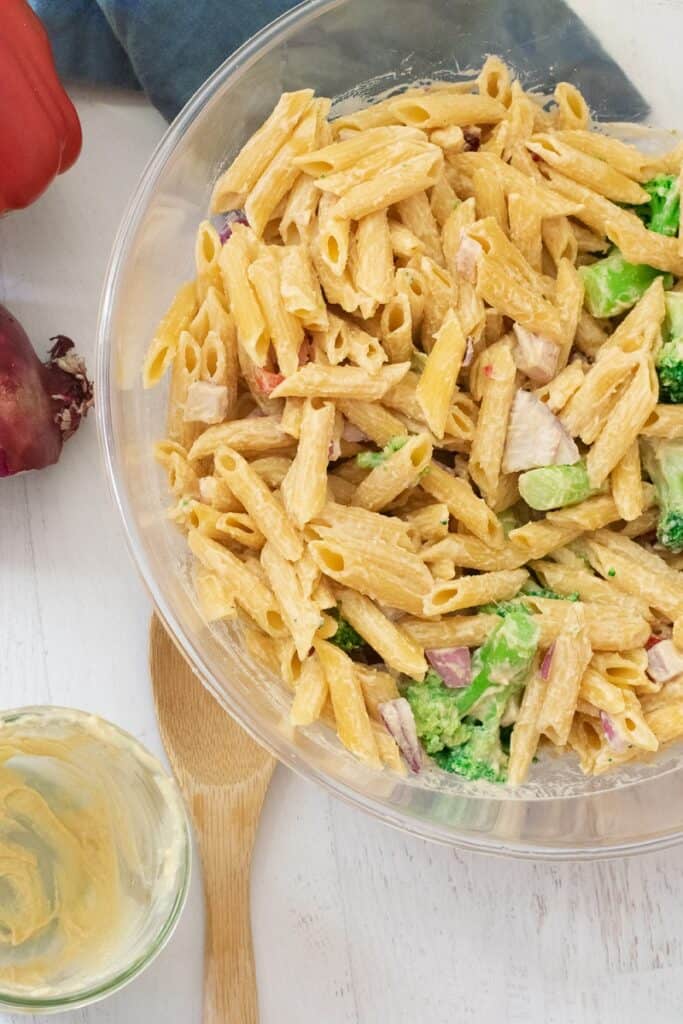

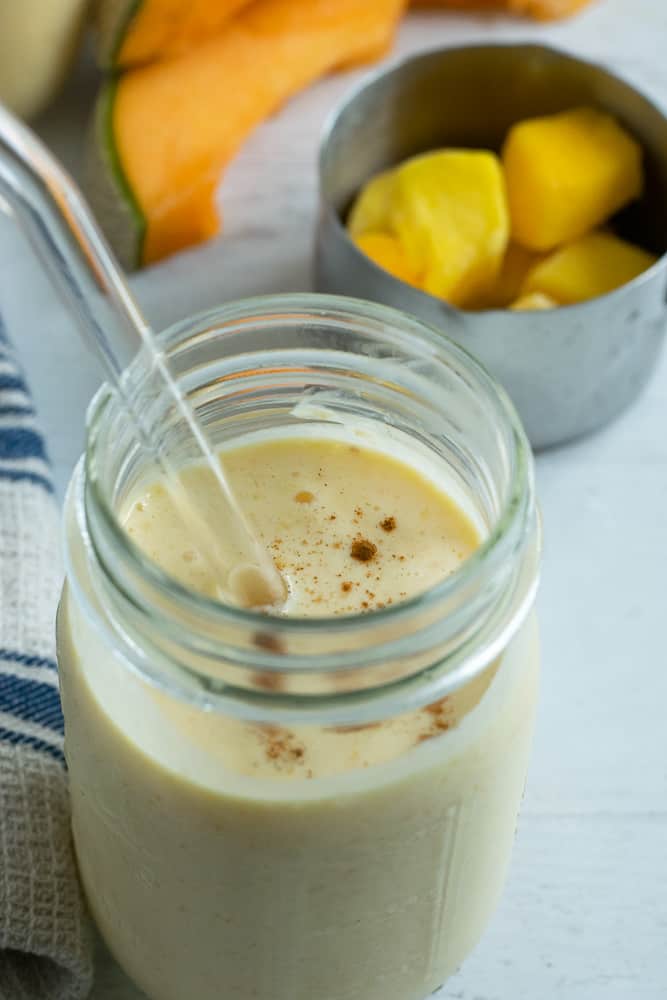

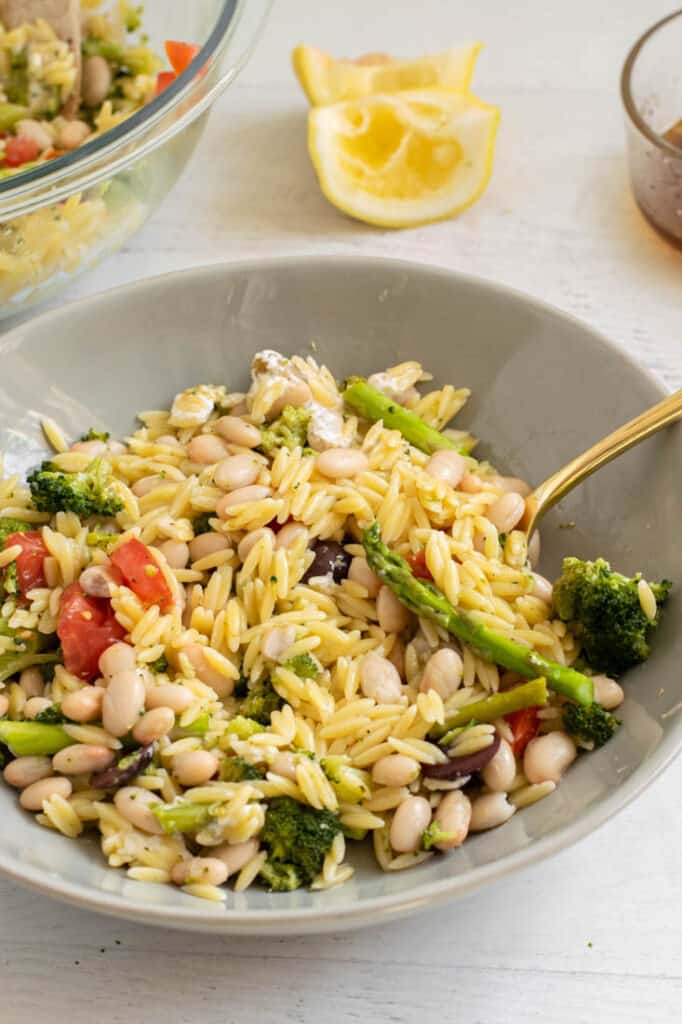

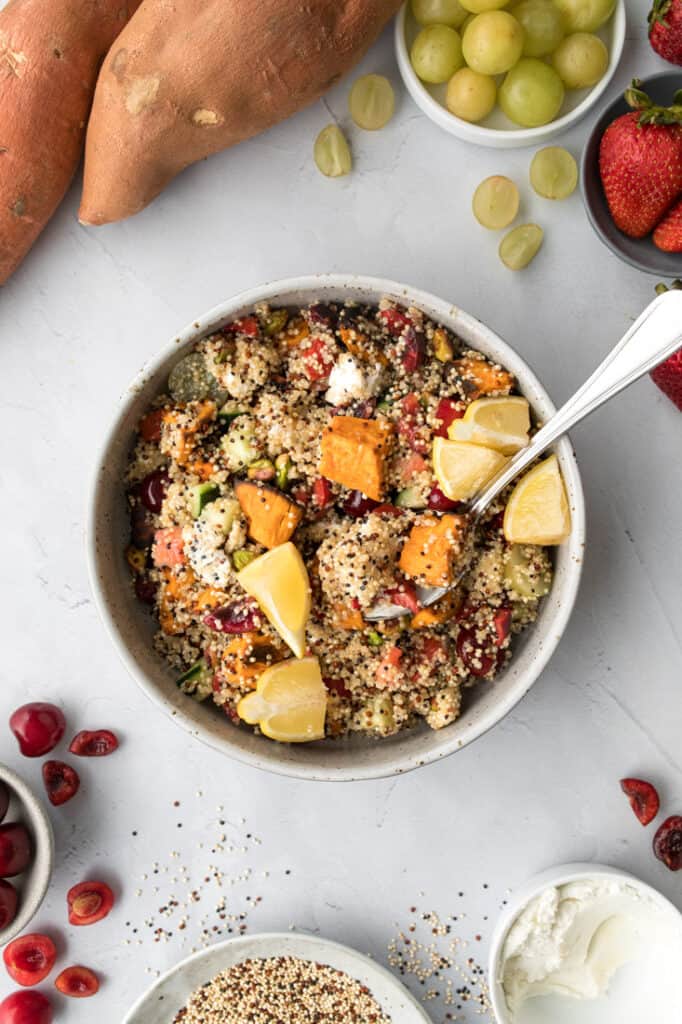


Like This Content?
Support Bucket List Tummy